
The House Judiciary Committee held a heated hearing Tuesday on the case of the Jena Six. Democratic lawmakers and community activists lambasted federal officials for not intervening despite the hanging of nooses on the schoolyard tree and District Attorney Reed Walters’s initial charges of second-degree attempted murder against the six African-American teenagers. [includes rush transcript]
Transcript
AMY GOODMAN: We turn to the ongoing fight for justice in Jena, Louisiana. The House Judiciary Committee held a hearing last Tuesday on the case of the Jena Six. Democratic lawmakers, community activists lambasted federal officials for not intervening, despite the hanging of nooses on the schoolyard tree and District Attorney Reed Walters’s initial charges of second-degree attempted murder against the six African-American teenagers for a schoolyard fight. Reed Walters was invited to the hearing but didn’t attend.
Many spoke of a worsening climate of overt racism, citing the recent spate of noose-hanging incidents well beyond Jena. House Judiciary Committee Chair John Conyers said, “Racial discrimination in the criminal justice system is not unique to any one place, but is found in cities and towns north and south throughout our nation.”
This is an excerpt of civil rights activist Reverend Al Sharpton’s testimony last Tuesday.
REV. AL SHARPTON: What I would beseech this committee to look into the fact that Jena is all over this country. It’s hangman nooses at Columbia University in New York. It’s even a hangman noose at the site of 9/11. It’s in North Carolina. It’s in California. All kinds of reports.
And what has been most troubling is the silence of the federal government in the face of this. Now, this is bipartisan. In the Republican administration of Dwight Eisenhower, Dwight Eisenhower sent the federal government into Little Rock. John Kennedy sent in the federal government, and the Justice Department was involved. So did Lyndon Johnson. What has happened in Jena and what has happened all over this country, we have not heard one federal response. It is almost like the national government is not in the country while we’re watching nooses on the news every night, while we’re watching hate crimes. And if we can’t appeal to the federal government, where can we go?
It has been rationalized by those in Jena, some, that these nooses was a prank. A prank to who? Grandchildren of people who saw their grandparents hang on nooses? If there is a prank, if there is a joke, the joke is, if we can represent to the world that we’re the land of the free and the home of the brave, but we can’t protect youngsters in Jena, Louisiana, and we can’t stop people from hanging nooses, and our federal government, after 50 years of bipartisan tradition of protecting people from states’ rights, has now decided it can no longer protect people from states that decide they can prosecute some 16-year-olds, if they’re black, as adults, but can’t process other 16-year-olds if they’re white, same age, but they qualify as juveniles.
Do we want harmony? Absolutely. Do we want the races to come together? Absolutely. But you cannot achieve racial justice by getting a premature racial quiet. There’s a difference between “peace” and “quiet,” Mr. Chairman. “Quiet” means shut up and allow a two-tier justice system to continue to exist. “Justice” means, we must have an even playing field. And the Justice Department, at the behest of this committee, needs to step into Jena and the Jenas of this country and establish that the federal government is still in charge, and the states did not win the Civil War.
AMY GOODMAN: That’s the Reverend Al Sharpton testifying before Congress. Donald Washington is the U.S. attorney for Louisiana’s Western District. He visited Jena last year, concluding the hanging of the nooses was not a hate crime. This is Congressmember Sheila Jackson Lee, Democrat of Texas, questioning Washington.
REP. SHEILA JACKSON LEE: September 2006, three nooses were found hanging, and the principal said, “Let’s expel them.” They were then — the students were suspended. Then, in the fall, we had a series of fights between black and white students. In late November, arsonists set fire to the school’s building. A white student beats up a black student who shows up at an all-white party. And my understanding is that a shotgun was pulled by a white man on three black students at a convenience store. Let me ask the chairman to put into the record, the U.S. attorney: nooses, beating at Jena High, not related; nooses, incidents evoke segregation. Right now I’m going to ask you —- and I’d like the people that are called to answer this question -—
REP. JOHN CONYERS: Without objection, this will be introduced into the record.
REP. SHEILA JACKSON LEE: I thank you, Mr. Chairman. I thank you. You stated on the record that nooses equal hate crimes. I’m asking you now, first of all, to go back to Jena, Louisiana, in the symbolic position that you hold, one, because you merited appointment, but you are the first black Western District U.S. attorney, and I’m asking you to go back, and I’m asking you to find a way to release Mychal Bell and the Jena Six.
My question that goes down the road: I want to know why, in the course of meetings of local district attorneys, why you didn’t engage with Mr. Reed Walters, who may be subject to prosecutorial abuse, and confer with him and say, “Mr. Walters, this is not the way to handle this case. I can see disparate treatment by white students being suspended back in school and by Mr. Bell being still in jail on an offense that he served 10 months for, 10 months, and therefore, the judge, the juvenile judge, could have said, 'Time served,' and he could have been released.” I want you to tell me why you didn’t engage with the DA, and I want you to tell me what you’re going to do now.
Reverend, I’d like you to tell me what — how they treated us when they came there. And, Dr. Ogletree, please tell me what federal action, legally and legislatively, that we can have.
Mr. Washington, tell me why you did not intervene, not by way of the legal system, but the consultation that the U.S. attorneys have with the local district attorneys. Why didn’t you intervene? These broken lives could have been prevented if you had taken the symbolic responsibility that you have, being the first African American appointed to the Western District. I don’t know what else to say. I am outraged! And that’s why my voice is going up like this. Literally outraged!
AMY GOODMAN: Minnesota Congressmember Keith Ellison sharply questioned Washington at Tuesday’s hearing. During the questioning, Ellison also turns to Reverend Brian Moran from the Antioch Baptist Church in Jena, Louisiana.
REP. KEITH ELLISON: In the course of this — my time on this committee, we have dealt with eight U.S. attorneys who were fired because they did not slavishly obey the dictates of the Bush Justice Department. And we had some people who got promoted, benefits accrued to them, because they did do what the Justice Department wanted them to do under Gonzales and Bush. You still have a job, don’t you?
DONALD WASHINGTON: Yes, sir.
REP. KEITH ELLISON: And I almost fell off my chair when you invoked the name of Martin Luther King to say that you are somehow the culmination of his work. Sir, I would expect you to quit in protest, based on that — based on your inability to use your discretionary latitude to charge these noose hangers. That’s what I would expect of somebody who is truly in fidelity with that great legacy of Martin Luther King.
Let me say that, you know, Jena Six is obviously the occasion that we’re here, but, you know, for those folks who are not from Jena, you know and I know that we’re outraged because we all have some Jena Sixes. We got some Minnesota Jena Sixes. You know, the fact is, is that nationally, according to the testimony of Professor Ogletree, black students are 2.6 times more likely to be suspended than white students. Overall, the numbers of students being suspended each year increased due to tough zero-tolerance policies. But that’s just school discipline. The fact is, juvenile justice data mirrored disparities in the school. 2003, African American youth were detained at a rate of four to five times higher than that of their white counterparts.
Aside from the issue of the civil rights decision and the hate crimes stuff, what about black youth and Latino youth in the criminal justice system and the over-incarceration of black people? We live in a country that incarcerates more than two million people. Don’t we have a system that is essentially using the legal — the criminal justice system to do what the Jim Crow system did in the past? Isn’t this just an extension?
But I just wanted to just go back to this eight U.S. attorneys thing, because this has taken up a lot of time here. And one of the things that always concerned me is not just the eight who were fired because they wouldn’t do — because they wouldn’t bring fake voting rights cases, but the people who stayed and kept their jobs. These people are the ones who I’m truly concerned about. And I guess, you know, one of the things that I would like to know is, Mr. Washington, have you prosecuted other juveniles in your tenure as U.S. attorney? Have you prosecuted other juveniles?
DONALD WASHINGTON: No.
REP. KEITH ELLISON: You’ve never — because, let me tell you, I’ve defended juveniles in federal court.
DONALD WASHINGTON: Yeah, well, I don’t —
REP. KEITH ELLISON: No, let me tell you, sir, I’ve been — I spent 16 years as a criminal defense attorney, and I’ve tried over a hundred cases to a jury, and I’ve defended juveniles in federal court. So you can’t tell me that the federal government doesn’t prosecute — you prosecute them for having five grams of crack cocaine.
DONALD WASHINGTON: Well —
REP. KEITH ELLISON: You told me — no, you put them in jail for that. You know, we have incarcerated generations over your drug war. And I say it’s yours, because you will not step away from an unfair system. And, you know, but what about the selective justice? You’re telling me you have never prosecuted a juvenile. We’re going to find out. Is that your statement under — is that your statement before Congress?
DONALD WASHINGTON: In my district. And you are asking me, I guess, about the Department of Justice, and I cannot speak to whether or when or how we prosecuted juveniles —
REP. KEITH ELLISON: Right. Well, let me just say this, Mr. Washington. You know, you’ve been on record saying that you believe that the noose hangers didn’t commit a crime, and now you’re saying today that they did. I’m glad to see that, and I want to give you credit for that. Have you changed your mind? Does that explain your change in testimony?
DONALD WASHINGTON: I don’t believe so, sir.
REP. KEITH ELLISON: Have you come to see the light? Is that why you’re saying that it’s a crime today?
DONALD WASHINGTON: I don’t think I’ve changed my testimony.
REP. KEITH ELLISON: Well, you changed your statement; do you agree with that?
DONALD WASHINGTON: I don’t think so.
REP. KEITH ELLISON: OK, well, I guess the reverend seems to have another alternative — another viewpoint. Reverend Moran, do you have another thing you’d like to share on that?
REV. BRIAN MORAN: Well, I think a gun on school property is a federal offense, is it not?
REP. KEITH ELLISON: I think that it certainly could be. What about that case about the guy having a gun pointed at —
REV. BRIAN MORAN: Justin Barker, the one that was accused of being jumped on at the school.
REP. KEITH ELLISON: Had a gun at school?
REV. BRIAN MORAN: Yeah, he had a gun — a loaded gun.
REP. KEITH ELLISON: Did he get prosecuted by a US attorney? Oh.
REV. AL SHARPTON: Or by the local district attorney.
REV. BRIAN MORAN: Nobody
REP. KEITH ELLISON: Or by nobody.
REV. BRIAN MORAN: Nobody
REP. KEITH ELLISON: You know, if you claim to be a beneficiary of the work of Martin Luther King, you’ve got to stand on that. You can’t just — it’s not a matter of career advancement. Martin Luther King did not do his work so you could get a Lexus and a nice house. It’s not just a matter of your own career advancement and buying consumer items. It is fidelity to a set of ideas.
AMY GOODMAN: That was Keith Ellison, Keith Ellison of Minnesota, the congressmember, as we turn now to Harvard Law School Professor Charles Ogletree, who also testified about race relations in Jena and beyond at the hearing. This is an excerpt of what he said.
CHARLES OGLETREE: There is a sign over the courthouse in Florida that has a useful epithet. It says the court is where the injured flock for justice. And it reminds me of how the people in Jena today are wondering: Where do they go? Where can they find a sense of justice? Where can they be treated not better, not differently, but just fairly?
This incident that we have been talking about is a microcosm of a larger set of incidents that have occurred in Jena. And yet, what occurred in Jena in 2006 is not isolated. It’s not different than what happened to Genarlow Wilson in Georgia or what’s happened in West Virginia, at the University of Maryland, and Hempstead, New York, at Columbia University. And the irony is that just a year ago I wrote a book with Professor Austin Sarat called From the Lynch Mobs to the Killing State: Race and the Death Penalty in America, looking back at the history of these incidents with the idea that, thank god, we’re not there anymore. And it’s ironic that one year after this book is published, looking at issues of lynching —
AMY GOODMAN: That was Harvard Law Professor Charles Ogletree testifying before the House Judiciary Committee on the Jena Six.

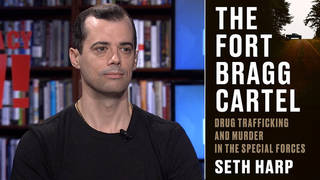
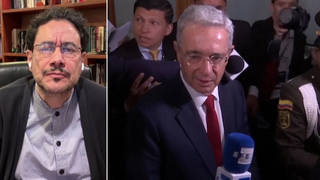

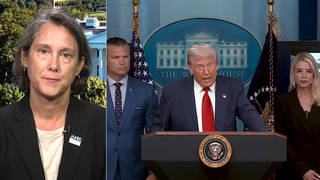





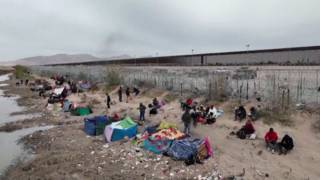

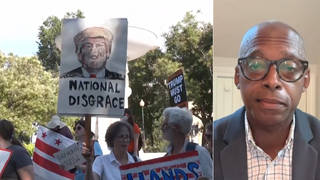
Media Options